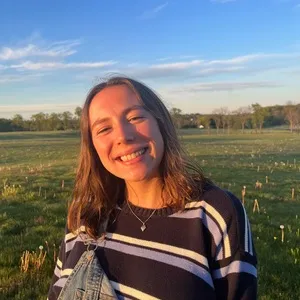Emma Jane Geisler started her college experience as most of us do: with absolutely no idea what direction her life would take her. At first, she thought she would attend the Eastman School of Music and go on to be a percussionist in the New York Philharmonic, but soon she felt that wasn’t it for her. So, Geisler decided to take a risk, transfer to The New School, and study environmental science. From there, she began creating videos on food waste content with topics ranging from climate change, how to find jobs in sustainability, tips for limiting food waste, and much more. We sat down with her to talk to her about her food waste tips and why she fell in love with creating content about the environment.
Spoon University: What are some easy changes college students can make in their daily life to help prevent or reduce food waste?
Emma Jane Geisler: Don’t be afraid to go back for seconds rather than taking a first plate. I would rather have a smaller amount and then go get more, than waste whatever I left on my plate. Additionally, does your school have compost? If it doesn’t, definitely encourage your school to get one.
Try to encourage your school to take on better practices when it comes to food waste. I think one thing I would do differently if I was a student and living in a dorm is to embrace having a community of people and schedule like a weekend brunch with your friends and try to use up all the food that you guys have.
SU: What aspect of the relationship between food and the environment do you find most interesting?
EJG: The difference in the way that we eat food now versus how we would have eaten hundreds and hundreds of years ago, thousands of years ago. Our relationship with food changed so much over the past thousands [of years] that sometimes food isn’t even recognizable to what it’s supposed to reflect. I often think about what we eat and how we eat is tied in with the environment, which we are destroying. If you can take this clementine that I’m eating for a snack and relate it all the way back to the oil industry, then I think that’s a really powerful tool in terms of motivating and activating people into having an interest in something like this.
SU: What are some resources you recommend if people want to learn more about helpful food waste practices?
EJG: @sciencebyashley and @environmentaleducation [on TikTok] both talk a lot about food waste. From the two of them, I have learned so much.
SU: What unexpected discoveries have you experienced when trying to reduce food waste?
EJG: I have learned a lot about composting. It is really easy but also depends on the kind of food that you eat. For example, I have been buying a lot of packaged foods lately simply because I just haven’t had a ton of time to cook. I find that it makes composting or reducing food waste a little bit trickier. A few months ago, I bought vegan cream cheese. I forgot about it, and it stayed at the back of my fridge.
Now, to get rid of that cream cheese, I have to open it up, look at this moldy cream cheese, put it in the compost or put it in the trash, make sure that it’s okay to go in the compost, and clean and recycle the container. I feel like I have so many jobs, expectations, and obligations that sometimes I just want to forget this cream cheese and throw it in the trash. However, living with my partner, he catches me and uses what I taught him. We don’t have to just trash it before we try to mindfully dispose of it. And I really appreciate that about him.
If you’re feeling this way, my best advice would be to set yourself up for success when it comes to composting or recycling is going to help the most. Make sure you have somewhere to put your compost and know where it’s gonna go, or where to take your recycling. Then, consider setting up a timer while you take out your compost or organize your recycling because I guarantee it doesn’t take as long as you think!
For more eco-friendly and sustainability content, make sure to follow @emmajanegeisler on TikTok.


